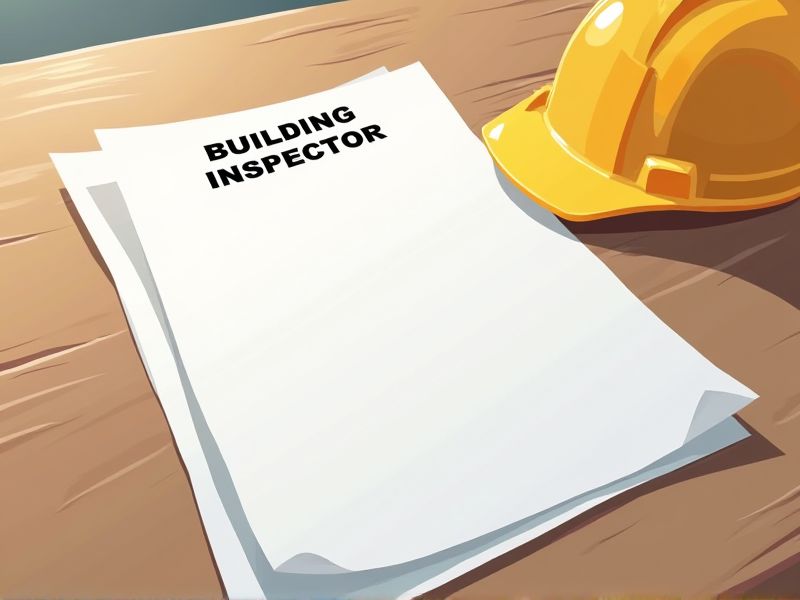
Building Inspectors ensure that construction projects comply with local codes and safety standards. This responsibility requires a comprehensive understanding of various structural, electrical, and safety regulations. Certifications provide evidence of expertise and enhance credibility, which is crucial for accurate assessment and enforcement. Key certifications for Building Inspectors include those related to specific codes and safety protocols.
ICC Building Inspector Certification
ICC Building Inspector Certification ensures that inspectors possess the necessary knowledge and skills to evaluate construction practices for compliance with building codes, promoting safety and quality in structures. It validates proficiency in critical areas such as structural integrity, electrical systems, and plumbing, ensuring inspectors can identify potential hazards. Certification establishes a standardized level of professional competence, which builds public trust and confidence in building inspections. This credential also enhances career prospects for inspectors by demonstrating a commitment to industry standards and continuous learning.
ICC Residential Building Inspector Certification
The ICC Residential Building Inspector Certification establishes a standardized knowledge base, ensuring that inspectors meet industry-recognized criteria. This certification enhances credibility and trust, as inspectors with it demonstrate a verified understanding of residential building codes and regulations. Building projects benefit from increased safety and compliance due to inspectors' certified expertise. A certified inspector is more likely to reduce liability for construction firms by catching errors and violations early in the building process.
ICC Commercial Building Inspector Certification
Obtaining the ICC Commercial Building Inspector Certification ensures that inspectors fully understand the latest building codes, which enhances safety and compliance in construction projects. The certification serves as a standardized benchmark of expertise, making inspectors more reliable for both employers and property developers. It also increases the inspector's credibility and employability in a competitive job market. Due to its rigorous assessment process, the certification signifies a high level of knowledge, reducing the risk of costly errors and construction delays.
Certified Code Official (CCO) Certification
The CCO certification ensures that building inspectors possess a standardized level of knowledge regarding safety, codes, and regulations. Certification leads to increased job competency, reducing the likelihood of oversights that could jeopardize public safety. Building officials who hold a CCO credential often find better employment opportunities and potential salary increases due to their validated expertise. Through CCO certification, a consistent benchmark is established across jurisdictions, streamlining interdepartmental communication and collaboration.
OSHA 30-Hour Construction Safety Certification
The OSHA 30-Hour Construction Safety Certification equips building inspectors with comprehensive knowledge of safety standards, which enhances their ability to identify and mitigate workplace hazards. By understanding OSHA regulations, inspectors are better prepared to enforce compliance, reducing the risk of accidents on construction sites. Certification offers credibility, boosting the inspector's authority when engaging with contractors and workers. Accreditation aligns with industry demand for safety-conscious professionals, fostering a safer construction environment.
NFPA Certified Fire Inspector Certification
Fire inspector certification from NFPA ensures building inspectors possess crucial knowledge of fire safety codes and standards. Familiarity with these regulations aids in identifying potential fire hazards in construction projects, enhancing life safety. Buildings with certified inspectors tend to experience fewer fire-related accidents due to thorough hazard assessments. This certification also increases trust in the inspector's authority and expertise, benefiting both construction firms and public safety.
Certified Construction Inspector (CCI) Certification
Obtaining a Certified Construction Inspector (CCI) certification enhances a building inspector's credibility and demonstrates their comprehensive understanding of construction codes and standards. This certification often leads to increased trust from employers and clients, making inspectors more competitive in the job market. The CCI credential signifies advanced knowledge and skill, which can reduce errors during inspections and contribute to safer building practices. Improved accuracy and adherence to regulations ultimately lead to fewer legal disputes and project delays.
ICC Plumbing Inspector Certification
Obtaining the ICC Plumbing Inspector Certification equips building inspectors with the necessary knowledge to accurately assess plumbing system compliance with codes. It ensures inspections are conducted consistently and professionally, reducing the likelihood of safety hazards and costly violations. Certified inspectors are more trusted by employers and clients, enhancing their job prospects and career growth. This certification indicates a commitment to high standards, elevating the overall quality of construction projects.
ICC Mechanical Inspector Certification
Pursuing the ICC Mechanical Inspector Certification ensures a building inspector has the necessary knowledge to evaluate mechanical systems accurately. This certification aligns a professional's skills with industry standards, enhancing their credibility and reliability in the field. Employing certified inspectors helps mitigate risks associated with mechanical failures by ensuring rigorous inspections. Obtaining this certification often leads to better job prospects and career advancement due to the specialized expertise it signifies.
LEED Green Associate Certification
The LEED Green Associate Certification equips building inspectors with essential knowledge about sustainable building practices, improving their ability to assess eco-friendly construction. Understanding LEED principles can help inspectors ensure that buildings comply with environmental standards, reducing energy consumption and resource wastage. This certification enhances the credibility of building inspectors, making them more valuable to employers seeking LEED-certified projects. In regions where green building regulations are becoming more stringent, having the LEED Green Associate Certification can be a decisive factor in career advancement for building inspectors.
Summary
When you attain additional certifications as a Building Inspector, your professional credibility enhances, leading to increased trust from employers and clients. This credibility often translates into more job opportunities and potentially higher income. As a result, you experience career growth and expand your expertise within the field. The certifications equip you with up-to-date knowledge, enabling you to conduct inspections with greater accuracy and compliance.
